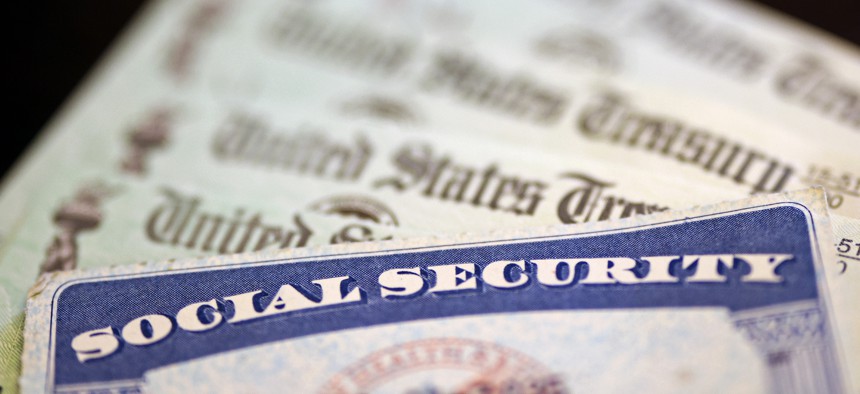
Kevin Dietsch/Getty
Social Security, COLAs, Earnings Limits and More
Answers to reader questions on pressing issues.
This week, I’m going to take up some questions I’ve received lately that I think are timely and relevant to those contemplating retirement and those who’ve already moved on.
The Future of Social Security
I read that the trust fund that pays Social Security retirement is projected to be depleted in 2034, one year later than last year’s estimate, with 77 percent of benefits payable at that time. I will reach 62 next year. Do you think I should file for my Social Security benefit in order to avoid this 23 percent reduction to my Social Security retirement benefit?
My short answer is “no.” A lot may happen between now and 2034. If major changes to Social Security are passed, they generally are not going to impact people who are retired or near retirement age. Acting Social Security Commissioner Kilolo Kijakaz has said, “it is important to strengthen Social Security for future generations. The trustees recommend that lawmakers address the projected trust fund shortfalls in a timely way in order to phase in necessary changes gradually.”
The problems with the funding of the Social Security trust fund should not be a major factor in your decision to file for Social Security retirement benefits, whether that’s when you’re first eligible at age 62 or as late as 70.
Cost of Living Adjustments
I am eligible to retire in July at my Federal Employees Retirement System minimum retirement age, which is 56 years and six months. If I work until mid-January, would my special supplement receive the COLA? This would be my last COLA till 62. I understand if I retire before 62 neither my pension or special supplement will receive a COLA until 62.
Answer: Your question seems to refer to both the retiree COLA and the pay adjustment that current employees generally receive in January each year. I explained the difference between those two things in last week’s column.
The FERS supplement, payable to those under age 62 who take an immediate, unreduced retirement, provides a temporary benefit to bridge the time from retirement to age 62, when most people qualify for Social Security retirement benefits. It is not adjusted by COLAs. In fact, it can be reduced if your earned income after retirement exceeds an annual limit. To learn more about the FERS supplement, see these previous columns: The Value of an Annuity Supplement and 5 Things To Know About Supplemental Retirement Benefits.
Special Provisions
I am a retired federal firefighter coming up on my MRA, which is 56 years and four months, in July. I am trying to figure out when the Office of Personnel Management will start asking me about my earnings. I retired in 2016.
Up to this point, you have not been affected by the earnings limit, because you retired under special provisions that apply to federal firefighters. These allow you to receive the supplement regardless of post-retirement earnings until you reach your MRA.
Now that you’re approaching that age, you might be surprised to know that you won't be contacted by OPM until next spring. They will send you a survey to find out how much earned income you’ve had since you reached your full retirement age (after July 2022 until Dec. 31, 2022). If the amount is over the 2022 limit of $19,560, then your supplement will be reduced by $1 for every $2 that your wages were over the limit. The reduction will begin with your July 1, 2023 retirement check, payable on Aug. 1 next year.
Medicare Part B Premiums
I'm wondering if you can provide some basic Medicare info, as I'm nearing 65, retired under the Civil Service Retirement System, with Blue Cross Blue Shield Basic option for health insurance. I know Medicare Part A is automatic, but it's the Part B I'm concerned about. I do not have 40 quarters of Social Security; therefore, I won't have that as an option to deduct Part B from a Social Security retirement check. Does Medicare deduct from my monthly OPM government pension check?
You can request to have your Part B premiums deducted from your OPM annuity as long as you’re not entitled to Social Security or Railroad Retirement Board benefits. Call 800-MEDICARE and let them know you’d like such a deduction. OPM must get requests for withholding from the Centers for Medicare and Medicaid Services. The agency can’t withhold premiums based on your direct request or even one from the Social Security Administration.
You can also pay your Part B premiums in one of the following ways:
- Online by credit or debit card at MyMedicare.gov. You'll need a copy of your Medicare bill to enter the amount you owe and your credit or debit card information.
- Directly from your savings or checking account through your bank's online bill payment service.
- By signing up for Medicare Easy Pay, a free service that automatically deducts premium payments from your savings or checking account each month.
- By mailing your payment to Medicare. Just fill out and sign the payment coupon that comes with your bill, and send it back with a check.
Correction: The original version of this column said the FERS supplement is trimmed for each month the recipient is under 62. The column has been updated to correct the error.







